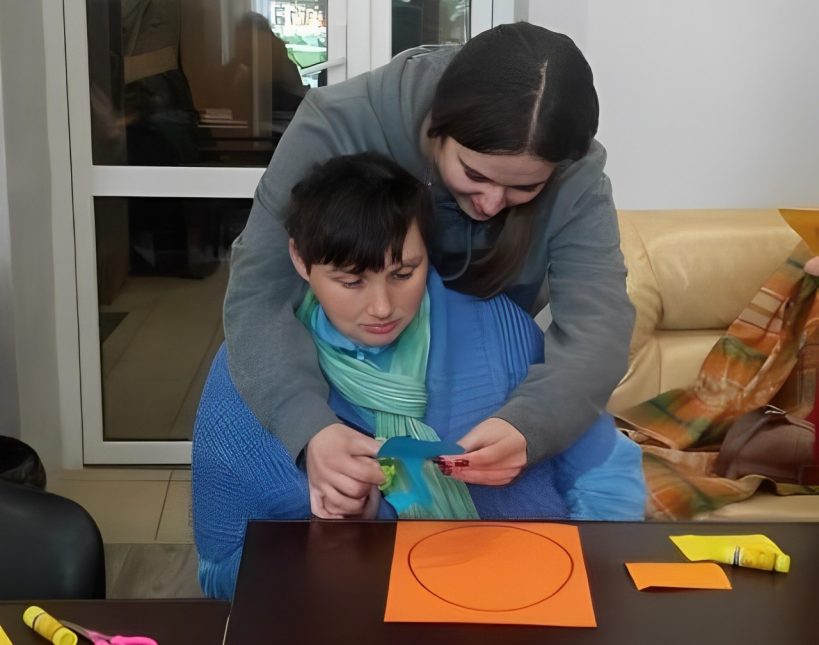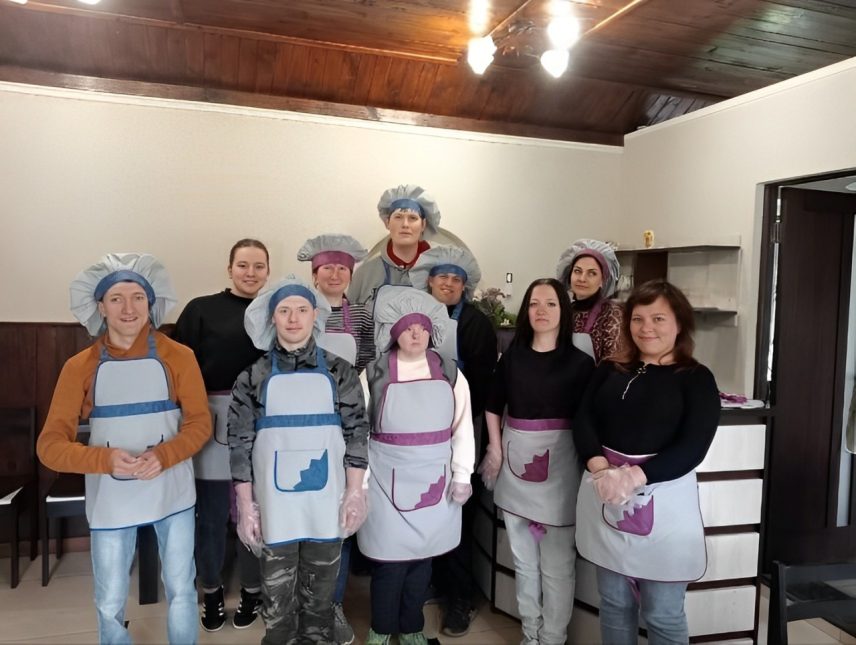
I feel like I’m in the right place: the psychology student helping people with intellectual disabilities
22/07/2024
When 18-year-old psychology student Veronika Taras started volunteering to work with children with intellectual disabilities, she initially found it difficult to connect. “I didn’t know how to approach things… how to avoid doing something wrong or offending anyone, but now I communicate freely. For example, there is a six-year-old boy who was very closed off when I first arrived. He barely communicated and didn’t engage. Now he draws, and he runs to greet me. I am very happy about this.”
Having completed a training course for students and young professionals for the protection of the rights of persons with intellectual disabilities, Veronika now works as a personal assistant for people with intellectual disability at the Drohobych Voluntary Society for the Protection of Disabled Children “Nadiya”, in western Ukraine. The initiative is part of an EU4Youth project to support people with autism, intellectual disabilities, and psychosocial disabilities in Ukraine. At the same time, Veronika is studying psychology at the Drohobych State Pedagogical University named after Ivan Franko.

“Participating in this project has been a great experience for me,” she says. “I have been working for three months now, initially volunteering at the ‘Nadiya’ organisation. I remember there was a cooking masterclass with so many children, noise, and everyone doing something. I was amazed…”
As a personal assistant for people with intellectual disability, Veronika conducts individual and group sessions: “Individually, I work with three young people – Ivan, Mykhailo, and Andriy. They are all 18-19 years old.” Individual sessions primarily focus on psychological topics based on individual requests: “For example, with Andriy we studied emotions in details and how to express them constructively.”
“Especially when it comes to emotions like sadness, anger, and aggression, people with intellectual disability often struggle with these emotions,” Veronika says. “Therefore, it is necessary to work on emotional intelligence skills.”
She puts a lot of effort into creating a warm supportive atmosphere in the team, and developing communication skills: “I really want the children and young people to communicate with others, to interact, to be friends with each other, to have a friendly atmosphere in the team. I even set such a goal for myself, and now I see the results. Now they communicate with each other differently than they did at the beginning of March.”
“Clear interaction rules have proved helpful in this process, for example, respecting each other, listening to each other, not interrupting. At first, I repeated persistently, sometimes I had to be strict, and now everyone has internalised these rules.”

After completing the project, Veronika plans to continue developing in the field of psychology and volunteering: “I feel like I’m in the right place. I find it interesting. I have become attached to the children. After the project ends, I will definitely continue volunteering here.”
The project ‘EU4Youth – Youth Employment in Times of Crisis: Personal Assistants Programme to Support People with Autism, Intellectual Disabilities, and Psychosocial Disabilities in Ukraine’ is funded by the European Union and Lithuania under the EU4Youth Phase III Employment and Entrepreneurship Programme, implemented by the Central Project Management Agency (CPVA) in Eastern Partnership countries, Armenia, Azerbaijan, Georgia, Moldova, and Ukraine.
The project aims to strengthen the resilience and build the capacities of the Ukrainian welfare community to respond to the impacts of Russia’s war against Ukraine, especially among youth. Additionally, the project seeks to enhance the capacity of young graduates and university students (in social work, special pedagogy, psychology, and other professions), as well as young professionals, by giving them working experiences and updating their skills to the circumstances of the war.
Currently, 271 young people have graduated from the project’s care services training, of which 98 volunteers such as Veronika, who have been contracted by NGOs and are volunteering to support people with disabilities in Ukraine.
News
-
The EU has supported Docudays UA since 2018
-
Сross-border renewable energy acceleration project to advance Ukraine’s green recovery
-
Kyiv, let’s celebrate International Children’s Day together!
-
Media literacy workshop in Cherkasy
-
EU provides €36.8 million in lifeline funding for UN Refugee Agency
-
Third School “Rehabilitation. Physical Therapist of the Future”